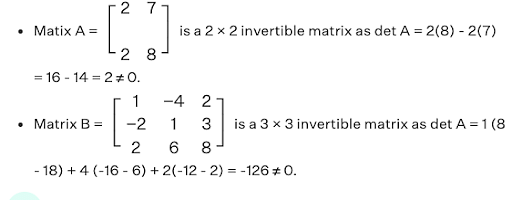Question:
If $A = \begin{bmatrix}1&1\\ 1&1\end{bmatrix}$ then $A^{100}$ :
If $A = \begin{bmatrix}1&1\\ 1&1\end{bmatrix}$ then $A^{100}$ :
Updated On: Dec 19, 2025
- $2^{100}A$
- $2^{99}A$
- $2^{101}A$
- None of the above
Hide Solution
Verified By Collegedunia
The Correct Option is B
Solution and Explanation
Let $ A = \begin{bmatrix}1&1\\ 1&1\end{bmatrix}$
$A^2 = \begin{bmatrix}1&1\\ 1&1\end{bmatrix} \begin{bmatrix}1&1\\ 1&1\end{bmatrix} $
$= 2 \begin{bmatrix}1&1\\ 1&1\end{bmatrix} = 2A$
$A^3 = 2^2 \begin{bmatrix}1&1\\ 1&1\end{bmatrix}$,
$A^4 = 2^3 \begin{bmatrix}1&1\\ 1&1\end{bmatrix}$
$A^3 = 2^2 A, \, \, \, A^4 = 2^3 A$
$\therefore \, A^n = 2^{n - 1} \begin{bmatrix}1&1\\ 1&1\end{bmatrix}$
$\Rightarrow \, A^{100} = 2^{100 - 1} A $
$ \therefore \, A^{100} = 2^{99} A$
$A^2 = \begin{bmatrix}1&1\\ 1&1\end{bmatrix} \begin{bmatrix}1&1\\ 1&1\end{bmatrix} $
$= 2 \begin{bmatrix}1&1\\ 1&1\end{bmatrix} = 2A$
$A^3 = 2^2 \begin{bmatrix}1&1\\ 1&1\end{bmatrix}$,
$A^4 = 2^3 \begin{bmatrix}1&1\\ 1&1\end{bmatrix}$
$A^3 = 2^2 A, \, \, \, A^4 = 2^3 A$
$\therefore \, A^n = 2^{n - 1} \begin{bmatrix}1&1\\ 1&1\end{bmatrix}$
$\Rightarrow \, A^{100} = 2^{100 - 1} A $
$ \therefore \, A^{100} = 2^{99} A$
Was this answer helpful?
1
0
Top Questions on Invertible Matrices
- If A is a non-identity invertible symmetric matrix, then \(A^{-1}\) is:
- CUET (UG) - 2023
- Mathematics
- Invertible Matrices
- Which of the following matrices can NOT be obtained from the matrix \(\begin{bmatrix} -1 &2 \\ 1 & -1 \end{bmatrix}\) by a single elementary row operation?
- JEE Main - 2022
- Mathematics
- Invertible Matrices
- The number of matrices of order 3 × 3, whose entries are either 0 or 1 and the sum of all the entries is a prime number, is _________.
- JEE Main - 2022
- Mathematics
- Invertible Matrices
- If A and B are invertible matrices then which of the following is not correct ?
- KCET - 2021
- Mathematics
- Invertible Matrices
- The inverse of the matrix $\begin{bmatrix}2&5&0\\ 0&1&1\\ -1&0&3\end{bmatrix} $ is
- KCET - 2019
- Mathematics
- Invertible Matrices
View More Questions
Questions Asked in BITSAT exam
- What is the dot product of the vectors \( \mathbf{a} = (2, 3, 1) \) and \( \mathbf{b} = (1, -1, 4) \)?
- BITSAT - 2025
- Vector Algebra
- Find the determinant of the matrix \( A = \begin{bmatrix} 2 & 3 \\ 4 & 5 \end{bmatrix} \).
- BITSAT - 2025
- Matrices
- A convex lens has focal length 20 cm. An object is placed at a distance of 40 cm from the lens. What is the position of the image formed?
- BITSAT - 2025
- Ray optics and optical instruments
- What is the value of \( \sin 30^\circ \)?
- BITSAT - 2025
- Trigonometry
- The area enclosed between the curve \(y = \log_e(x + e)\) and the coordinate axes is:
- BITSAT - 2025
- Fundamental Theorem of Calculus
View More Questions
Concepts Used:
Invertible matrices
A matrix for which matrix inversion operation exists, given that it satisfies the requisite conditions is known as an invertible matrix. Any given square matrix A of order n × n is called invertible if and only if there exists, another n × n square matrix B such that, AB = BA = In, where In is an identity matrix of order n × n.
For example,
It can be observed that the determinant of the following matrices is non-zero.
